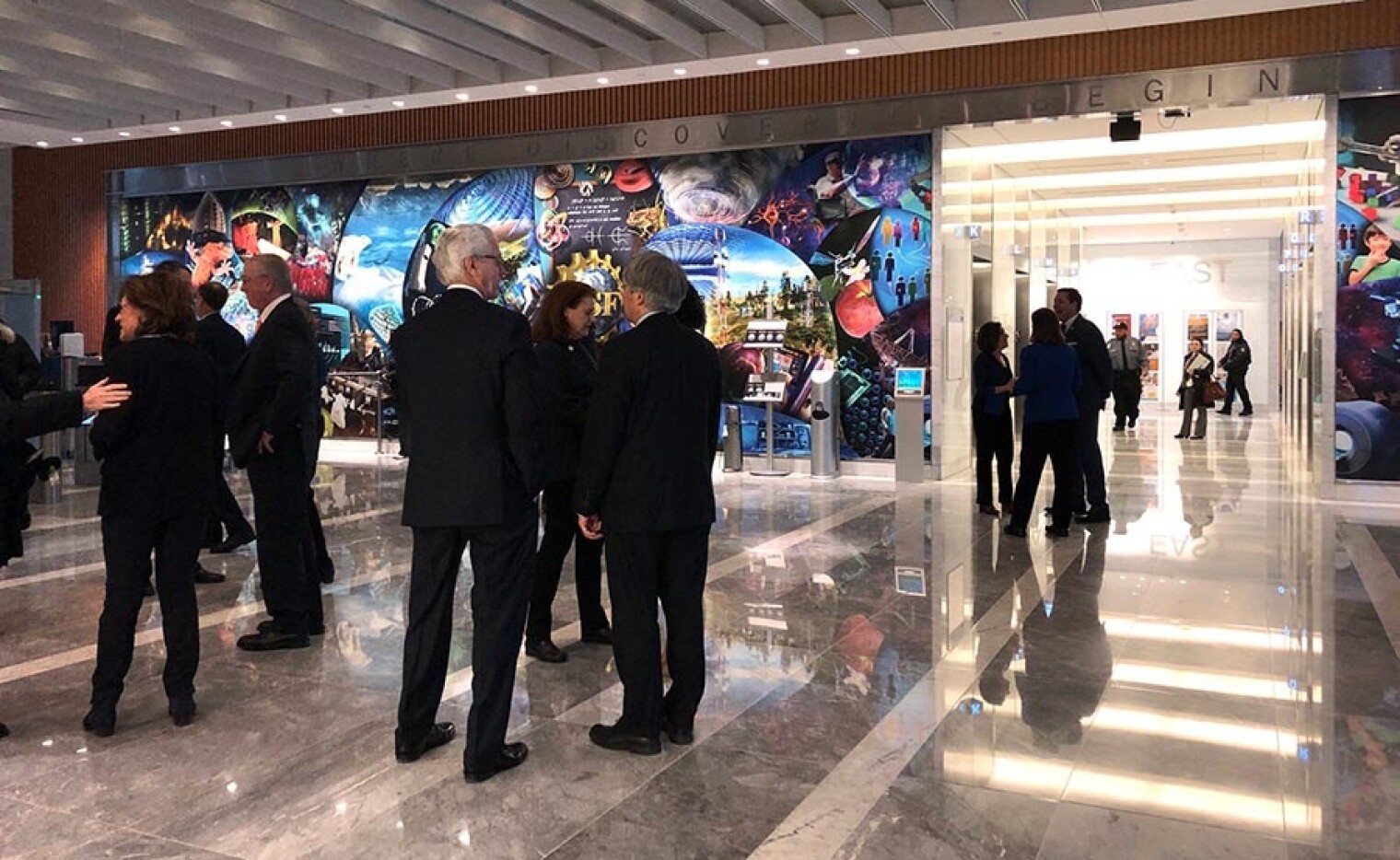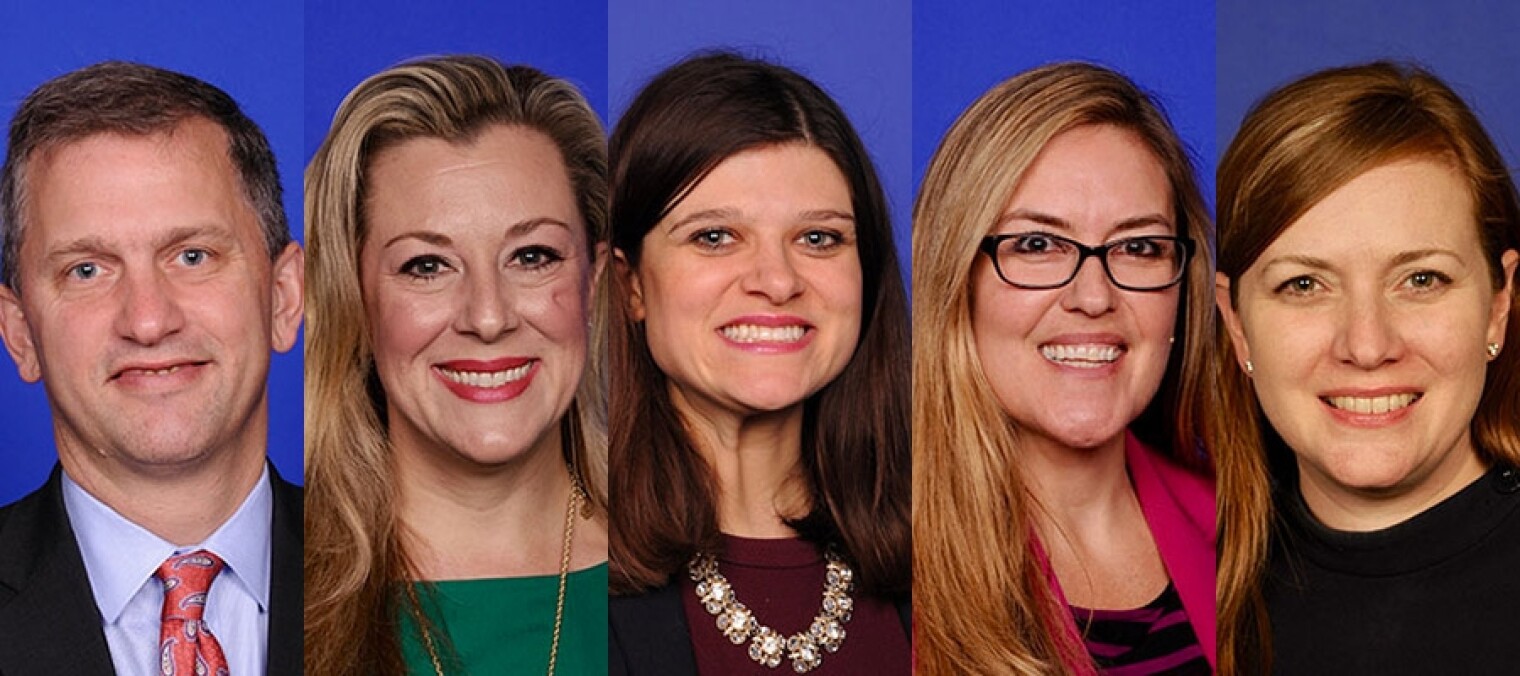| |
What’s Ahead
 |
| Top officials at the National Science Foundation met in the agency’s lobby on Jan. 28, their first day back together at work since the government shutdown began on Dec. 22. (Image courtesy of Jennifer Wade) |
Scientists Return to Work as Federal Agencies Reopen
The longest federal government shutdown in U.S. history ended last Friday after 34 days when President Trump signed stopgap spending legislation that reopens affected agencies through Feb. 15. Furloughed federal employees are back at work this week and are expected to receive back pay within days. Grant and contract disbursements can also now resume, replenishing the reserves of research institutions that depend on government funding to operate. However, normal operations are not expected to resume for months as researchers and agency officials make up for lost time.
For instance, the National Science Foundation will have to reschedule over one hundred grant review panels that it cancelled this month. The agency has also canceled several meetings previously scheduled for this week, including the Astronomy and Astrophysics Advisory Committee meeting and design review panels for planned upgrades to the Large Hadron Collider. NASA has delayed the deadlines for its upcoming Research Opportunities in Space and Earth Sciences grant opportunity for at least 60 days. The prospect of a follow-on shutdown also looms over agencies, hampering their ability to reschedule activities with confidence.
Congress Setting to Work to Prevent Another Shutdown
Although there is reportedly little appetite at the White House or on Capitol Hill for another shutdown, there is still no sign of any resolution to the conflict over a proposed border wall that precipitated the one that just ended. The leaders of each party in the House and Senate have established a “conference committee” to attempt to hammer out a special border security spending package that will satisfy all parties. There have not yet been any indications of whether Congress will attempt to advance any other spending legislation while those negotiations are ongoing. If no deal is reached by the end of the stopgap period, it is possible that Congress and the White House could agree to a further extension rather than allow another shutdown to ensue.
Intelligence Chiefs to Update Congress on Concerns over Chinese Tech
On Tuesday, the leaders of six intelligence agencies will offer their assessment of top security challenges facing the U.S. at the Senate Intelligence Committee’s annual hearing on “worldwide threats.” At last year’s hearing, FBI Director Christopher Wray discussed the espionage risk posed by Chinese nationals studying and working in STEM fields in the U.S., triggering a wave of attention to the subject that has not yet subsided. The New York Times reports that witnesses at this year’s hearing are expected to raise concerns about how next-generation telecommunications networks being developed by the company Huawei could be co-opted by the Chinese government for spying purposes. Huawei is currently under intense scrutiny in the U.S. and Western countries because of such allegations, though the company has denied it facilitates espionage. Lawmakers have already worked to decrease the company’s footprint in the U.S., mandating that federal grant funds cannot be used to procure its equipment. Reuters reported last week that several U.S. universities have stopped using Huawei equipment because of this provision.
DOE to Spotlight Microreactors
The Department of Energy’s Office of Nuclear Energy is co-hosting a congressional briefing this Tuesday on microreactors as part of an ongoing series. Microreactors have attracted the interest of entrepreneurs as well as a number of policymakers because many are designed to be portable and they could be used to generate nuclear power in remote locations, such as at military bases. DOE is currently developing a pilot program with the Department of Defense to assess how microreactors could increase the resilience of national security infrastructure. In recent testimony, the head of the Office of Nuclear Energy predicted microreactors “may well be the first advanced non-light water reactors to be commercially available.”
DOE to Discuss Carbon Capture Technology Landscape
The Atlantic Council is hosting an event Monday to discuss how U.S. carbon capture and storage (CCS) technologies compare with those in other countries. Among the speakers are Steven Winberg, the head of the Department of Energy’s Office of Fossil Energy, and Lynn Brickett, a CCS program manager at the National Energy Technology Laboratory. DOE currently spends about $200 million each year on CCS. The technology could gain greater attention this year as Congress takes a more active interest in climate policy. Last year, the Senate considered a bipartisan bill to facilitate CCS projects that may be reintroduced in the current Congress.
|
|
In Case You Missed It
 |
| Most of the new faces on the House Science Committee’s Democratic majority are also new to Congress, including, from left, Reps. Sean Casten (D-IL), Kendra Horn (D-OK), Haley Stevens (D-MI), Jennifer Wexton (D-VA), and Lizzie Fletcher (D-TX). (Image credits - U.S. House of Representatives) |
Science Committee Announces Members for 116th Congress
Both the Democrats and Republicans on the House Science Committee released their committee rosters last week, though neither side has yet announced who their subcommittee leaders will be. One notable departure from the committee is Rep. Marc Veasey (D-TX), who had been the top Democrat on the Energy Subcommittee. Of the new faces on the Democratic side, most are also new to Congress. Among them:
- Rep. Sean Casten (D-IL) has a master’s degree in biochemical engineering and co-founded a company specializing in recovering waste energy from industrial plants. He represents a district adjacent to both Argonne National Laboratory and Fermilab. In a statement announcing his assignment, he said, “I have dedicated my career to science and understand whole-heartedly you can’t make informed decisions without accurate information. … My mission on the committee is not only to implement meaningful long overdue change on issues such as climate change but also to make decisions based on facts.”
- Rep. Kendra Horn (D-OK) was formerly head of government affairs for the Space Foundation, a nonprofit organization dedicated to promoting space-related activities. In a December interview with Politico, she expressed a strong interest in shoring up the U.S. satellite infrastructure for communications, navigation, and weather observations.
- Rep. Haley Stevens (D-MI) represents a suburban Detroit district and has spent much of her career working in economic development policy. In a December interview with a local newspaper, she expressed a desire to serve on the Science Committee, citing her interests in technical skills training and technology transfer.
- Rep. Jennifer Wexton (D-VA), a lawyer, defeated former Research and Technology Subcommittee Chair Barbara Comstock (R-VA) in their race to represent a Northern Virginia district in which many employees of the National Science Foundation and other federal agencies and contractors live. In a statement to a local newspaper, Wexton expressed her desire to support the large concentration of high-tech companies that are based in the region.
- Rep. Lizzie Fletcher (D-TX), also a lawyer, defeated Rep. John Culberson (R-TX), who was an influential advocate for funding science and space exploration. Asked by the Houston Chronicle about her own interest in these areas, she replied, “It’s critical that we support scientific research and exploration. I think that it’s something that we don’t see as much in this administration and this Congress. There’s really a kind of antipathy for science.”
On the Republican side, Rep. Pete Olson (R-TX) is returning to the committee. Like Fletcher, Olson represents a Houston-area district near the Johnson Space Center and previously served on the committee during the 111th Congress. Another new member, Rep. Michael Waltz (R-FL), is new to Congress and represents a district on the Florida coast just north of the Kennedy Space Center.
Other Science Subcommittee Leaders Announced
Last week, the Senate Commerce, Science, and Transportation Committee announced the full rosters of its subcommittees. Sen. Kyrsten Sinema (D-AZ) will be the top Democrat on the Aviation and Space Subcommittee, while Sen. Tammy Baldwin (D-WI) will chair the Science, Oceans, Fisheries, and Weather Subcommittee. The House Armed Services Committees also announced its subcommittee assignments last week. The most notable development is that Rep. Mike Rogers (R-AL) is stepping down from his role as top Republican on the Strategic Forces Subcommittee, which oversees the National Nuclear Security Administration, to become the ranking member on the Homeland Security Committee. Rep. Mike Turner, a former chair of the subcommittee, is taking his slot.
DOD Sets Deadline to Establish Space Development Agency
The Department of Defense has set a deadline of March 29 to create a Space Development Agency, according to an internal memorandum that has been obtained by the media. The precise role of the new agency remains to be determined, but the aim is for it to coordinate the department’s development and acquisition of new defense space technologies. According to the memo, the agency will be under the authority of Under Secretary of Defense for Research and Engineering Mike Griffin, who is to submit a plan for setting it up no later than March 1.
|
|
Events This Week
Senate: “China and Russia”
10:00 am, Armed Services Committee (G50 Dirksen Office Building)
|
|
Opportunities AMS Seeks Participants for Congressional Visit Day
The American Meteorological Society is seeking member volunteers to attend a Congressional Visit Day focused on climate science on March 13. The purpose of the event is to provide members of Congress and their staff the “best possible access to scientific information on climate science when making policy decisions” rather than advocate for a particular policy outcome. Applications are due Feb. 12.
Applications Open for AAAS Advocacy Workshop
The American Association for the Advancement of Science is accepting applications for its Catalyzing Advocacy in Science and Engineering (CASE) workshop. Held from March 24 to 27 in Washington, D.C., the workshop is open to undergraduate and graduate students interested in learning about the role of science in policy making. The application deadline varies by sponsoring institution.
Science Debate Awarding Science Policy ‘Mini-grants’
Science Debate, a non-profit organization, is accepting proposals for small projects that promote discussion of science policy by 2020 presidential candidates. Proposals will be reviewed as they are received through Feb. 28.
Know of an upcoming science policy opportunity? Email us at fyi@aip.org.Know of an upcoming science policy event? Email us at fyi@aip.org.
|
|
Around the Web
News and views currently in circulation. Links do not imply endorsement.
Federal Government Shutdown
Congress
Political Engagement
Science, Society, and the Economy
Education and Workforce
Research Management
Labs and Facilities
Energy
Quantum Science and Technology
Space
Weather, Climate, and Environment
Defense
Biomedical
International Affairs
|
|
|
| |
| |
|
